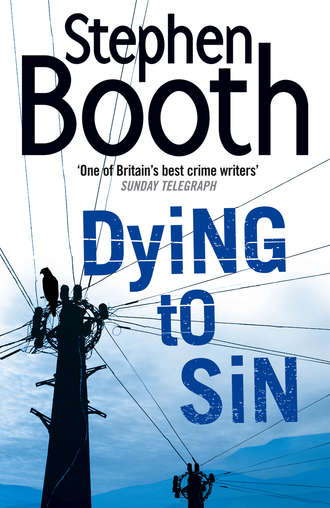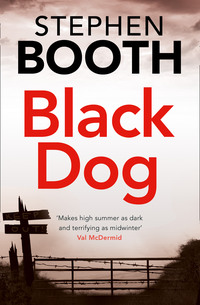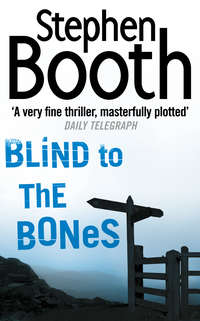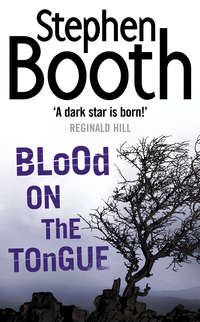
Полная версия
Dying to Sin
‘So there’s no point in us rushing around if the case is so old, sir?’ asked someone.
‘Well … that’s not something I want to hear anyone saying publicly. But it does mean we can let the anthropologist and forensics team do their thing for a while yet, and the mince pies might not have to go cold.’
There were a scattering of half-hearted cheers, but the relief was palpable.
Hitchens acknowledged the reaction with a slight smile. ‘Meanwhile, a few basic procedures are in order, to make sure we’ve covered the ground. If we do have to open a murder enquiry later on, I don’t want to hear that we missed vital evidence in the early stages because someone was in too much of a hurry to do their Christmas shopping. Understood?’
‘Yes, sir.’
‘For a start, we need information on all these workmen – anyone who’s been on site. Names and addresses, dates of birth – you know the drill. Then we can run them through the PNC if necessary.’
‘What about their status?’ asked Fry.
‘Status?’
‘I was thinking that some of them might have residency or immigration issues. You know how difficult it is to get information when they’re worried about being arrested or deported.’
‘I thought someone told me they were all Polish?’ said Hitchens. ‘Poles don’t have residency or immigration issues – they’re members of the EU, so they can come and go when they like, and they don’t need work permits either.’
Murfin raised a hand, enjoying being the man with the answers for once. ‘Apparently, most of these blokes work for an agency, which sends them wherever the work is. It means they don’t have a settled address, sir. They live in digs, bed and breakfasts, caravans, whatever is available. They say it’s worth their while – they get about twice the minimum wage, enough to send money home, if their families aren’t in this country.’
Fry glanced across at the little huddle of builders in their safety boots and yellow hard hats. ‘We’re only assuming they’re all Polish. The foreman is, but we haven’t checked the rest out yet, so we might get some surprises.’
‘Don’t tell me we’re going to have to find translators,’ said Hitchens. ‘At Christmas? Their statements alone could take weeks to process.’
‘Well, maybe we don’t need them.’
‘No. You’re right, DS Fry. Let’s prioritize, shall we? We’re dealing with the foreman and the lad who actually found the body. What’s his name?’
‘Jamie Ward.’
‘Jamie Ward, right. The rest can wait, as long as we know where to find them. Meanwhile, we need everything we can get on the family who lived here. Two brothers, Raymond and Derek Sutton, and anyone associated with them. I’ll be speaking to the surviving brother myself this afternoon, when we establish which care home he’s in. There’s a village over that way somewhere, called Rakedale. We’ll be starting house-to-house there tomorrow morning. Everyone OK with that?’
There were murmurs of agreement and a general shuffling. Everyone was now anxious to get finished and go home.
Cooper fell into step with Fry as the impromptu meeting broke up. Their feet squelched as they walked back towards their vehicles from the outer cordon.
‘What do you think, Diane? Are we going to have to interview all the builders?’
‘I hope not.’
The crew working on the conversion of Pity Wood Farm had created their own access, widening an old field entrance and laying down a gravel roadway to reach the back of the farm. The area they’d been working in was getting very muddy, and Scenes of Crime had managed to lay a series of duckboards to reach the site of the grave, which would protect evidence better than their temporary bridge. Anyone who stepped off those duckboards was getting splattered with mud. One or two of the more carelessly parked vehicles might have to be towed out at the end of the day.
Cooper could see Liz Petty talking to two of her SOCO colleagues. They were probably awaiting the arrival of the Northern Area Scientific Support Officer, who was based at C Division headquarters in Chesterfield.
He badly wanted to acknowledge Liz, but they’d agreed to keep their relationship low profile when they were at work. Not secret, exactly – it would never be a secret in E Division. But they both felt it was important to be professional, and not to give anyone cause for complaint.
When he saw the front of the farm, Cooper realized why the builders had gone in the back way. The main access must already have been an ocean of mud when they arrived. It looked as though the previous owners had allowed their cattle free rein. The ground was seriously poached, right up to the walls of the farmhouse. The lane from the gate past the barn would be almost impassable on foot, unless you were wearing waders.
Cooper shook his head. No one would have allowed that to happen unless they no longer cared about the farm, or had no stake in its future.
He pulled his Toyota over towards the wall and leaned on the topping stones for a while. He could see that someone had been into Pity Wood this way, and quite recently. Tyre tracks ran through the mud, where a vehicle had churned deep, wet ruts. The tracks didn’t run all the way up to the house, but stopped near the barn. If he looked a bit more closely at the ruts, then asked around to find out when cattle were last in here, he could probably have a good stab at how long it was since the vehicle had come and gone.
But it didn’t matter, did it? This crime wasn’t recent enough.
Cooper felt sure they’d be looking into the past to find the information they needed, studying that little time capsule of a kitchen, not the cement-covered building site. The answers would lie in the lives of the people who’d abandoned Pity Wood Farm to its fate.
4
At The Oaks residential care home in Edendale, Raymond Sutton was sitting in the big lounge – the one with a view of the fields at the back, where he got an occasional glimpse of cattle grazing in the distance. Holsteins, but it was better than nothing. The TV was on, of course. Some of the old girls watched it all the time, though they didn’t always know what they were seeing. Most of the stuff that was on during the day was rubbish – brainless quiz shows, old films, kiddies’ cartoons. He’d never been one for sitting indoors watching the telly. Raymond liked the news, though. Just because you were old and getting a bit stiff in the joints, it didn’t mean you should let your brain cells die.
He saw a car enter the gateway from the road and head up the drive. Thanks to his new hearing aid, he could hear the tyres crunch on the gravel. There were many sounds that he’d missed when his hearing started to fail, but the noise of cars wasn’t one of them. His home at Pity Wood had been far enough off the road to save him from traffic.
He didn’t recognize this particular car. Red, which was unusual these days. Everyone seemed to go for grey or silver, which made it difficult to distinguish between them. He could see it was a four-wheel drive, too. Japanese – Mitsubishi, Toyota? One of those makes. He might have known the difference once, but it didn’t matter that much any more.
Four-wheel drive, though, and very muddy around the wheel arches and the bottom of the doors. Somebody who knew the countryside, then. He wondered which of the residents they were visiting.
One of the carers came into the room. The one called Elaine. Young, dark-haired, one of the nicer ones. She was always gentle with him when she had to get him out of bed or into the bath. A little bit of kindness could make his last days more tolerable.
‘Raymond,’ she said. ‘Are you feeling up to visitors? There are some people here asking to see you. They’re from the police.’
Cooper felt he could probably have done a better job interviewing Raymond Sutton on his own. But DI Hitchens was in charge of the investigation for now, so he was within his rights to do whatever he wanted. Some might say that the Senior Investigating Officer should be back at the office co-ordinating the enquiry and allocating resources, but what did he know? He was just a DC.
They were shown into a lounge by the care assistant, whose name badge said she was called Elaine. Mr Sutton had either been put in there on his own, or the other residents had been moved out somewhere else when they arrived. Whichever it was, they found the old man in splendid isolation, perched in one of those big chairs that only old people ever sat in. There were other, similar chairs ranged round the walls of the room, and a big television set stood in the corner, mercifully switched off a moment before. Many interviews conducted in people’s own homes resulted in conversations shouted over the noise of the telly. It was often a temptation to take someone down to the station just for the sake of being able to hear what they were saying.
‘Mr Sutton? I’m Detective Inspector Hitchens, and this is Detective Constable Cooper. From Edendale CID.’
Hitchens offered a view of his warrant card, as procedure recommended. But Sutton held out his hand instead to greet his visitors, and Hitchens was obliged to shake it. Cooper did the same, grasping a hand with paper-thin skin that trembled slightly in his palm. The old man smelled of soap, and his clothes were clean and neat, though the cardigan he was wearing no longer fit him so well as it once might have.
They sat on chairs either side of him, and Hitchens opened the conversation.
‘Mr Sutton, you are the former owner of Pity Wood Farm at Rakedale. Is that right?’
‘Aye. That’s where I live. Pity Wood.’
Hitchens shook his head. ‘That’s where you used to live. You sold the farm, didn’t you?’
‘I did. You’re right. I don’t remember who bought it.’
‘We know who bought it, Mr Sutton.’
‘Who was it? I can’t remember their name.’
‘Mr Goodwin, from Manchester.’
‘I don’t know him. It was all done through the estate agents and solicitors. You’ll have to ask them where he is.’
‘No, we want to ask you about Pity Wood Farm.’
‘Pity Wood, that’s where I live.’
‘You don’t live there any more. Don’t you remember?’
Sutton laughed – a dry, crackly laugh, with little humour in it, as if the DI was tormenting him with a feather in a sensitive spot.
‘I remember some things quite well. But I don’t recall this feller that bought the farm. What did you say his name was?’
‘Goodwin.’
‘I don’t know him.’
‘No sir –’
The old man turned away from Hitchens and studied Cooper instead, his eyes glinting. ‘You’ll come to see me again, won’t you? I don’t get many visitors.’
Hitchens became impatient then, and made the mistake of putting his hand on Sutton’s sleeve to get his attention. The old man drew his arm away abruptly and stared at Hitchens in indignation.
‘Just a minute, young man. Take your hands off me, or I’ll get them to send for the police.’
‘Mr Sutton. We have to ask you some questions, I’m afraid, sir. There have been human remains found at Pity Wood this morning. The dead body of a woman. We need to know how this person ended up buried on your farm.’
‘Questions? Well, you can only try. Open the barn door, and you might find a cow.’
Hitchens opened his mouth, but shut it again quickly, as if he’d just found the cow and didn’t want it to escape.
They left Mr Sutton sitting in the lounge on his own, and found the care assistant who’d let them in to The Oaks.
‘I’m sorry if you didn’t have much luck, Inspector,’ she said. ‘Raymond has good days and bad days. You’d be surprised how much he can remember sometimes. His brain is still quite active. But other times, he gets a bit, well… confused, even distressed. It’s perfectly normal for his condition, but you can never quite tell what’s going to upset him. Memories, I suppose.’
‘If he has a good day, would it be possible to bring him out for a couple of hours?’ asked Hitchens. ‘We’d like him to come and see the farm.’
‘His old home? Oh, I’m sure Raymond would love that.’
‘I take it he’s physically fit enough?’
‘Oh, yes. He has no major health problems, considering his age. In fact, the doctor says Raymond is quite a tough old bird. He’ll probably still be around in ten years’ time, when all our other residents have gone. It must come from being a farmer, I suppose.’
‘And the wonderful care he gets here, I’m sure.’
‘Why, thank you, Inspector.’
Hitchens nodded, turning on his most charming smile. Cooper couldn’t help raising an eyebrow. Personally, he didn’t think Raymond Sutton would love a day out at Pity Wood Farm at all, but perhaps he was wrong about that, too.
‘Yes, if the weather is decent, we’ll put a wheelchair into the minibus and Colin will drive Raymond up to Rakedale to visit the farm. But you won’t tire him out, will you?’
‘Not at all. We’ll send him back as soon as he wants to come.’
‘Fine, Inspector. Can we give you a call when we think he’s ready?’
The DI produced his card and handed it over with a gesture almost like a small bow. Cooper felt like gagging. But then, he wasn’t the person the Hitchens charm was being aimed at.
‘Sir,’ said Cooper as they were leaving, ‘do you think Raymond Sutton knows who buried the body at the farm?’
‘Almost certainly.’
‘Could he be in danger? Might someone want to make sure that Mr Sutton doesn’t talk?’
‘They might. But how would they get to him in The Oaks? Their security is pretty good, and the staff know where every resident is twenty-four hours a day.’
‘I hope you’re right,’ said Cooper.
With a weary curse, Nikolai Dudzik tipped his yellow hard hat back from his eyes. ‘Look at these outbuildings. All the roof structures are rotten. Completely rotten. The whole lot will have to be stripped off, you know. We’re talking about a massive amount of new timber for the joists alone.’
Fry could see that Dudzik’s workmen had dug a network of trenches behind the barn for the new drainage and water supply. No pipes had gone in yet – they still lay in heaps at the edge of the field. But the trenches were half full of water, thanks to the rain that continued to fall intermittently on Pity Wood Farm. She could see that the clay must be non-porous. Further north, the limestone would let rain water through like a sieve. It was one of the few geological facts she’d learned since leaving Birmingham for the Peak District.
‘There must be some old drains over that way somewhere,’ said Dudzik, gesturing towards the tumble-down ruins of a cowshed. ‘We haven’t found them, and we’re not looking for them any more. God knows what state they’ll be in. They must be very, very old.’
Inside the outbuildings, someone had started chipping the old plaster off the walls. Layers of dust covered the floor, and the exposed stonework looked inexplicably damp.
‘If it was up to me, the whole thing would come down,’ said Dudzik. ‘Then we could start from scratch and do a proper job. But we have to retain the original features. Original features! Bits of old stone and rotten timbers. What’s the point? I ask you.’
Fry let him talk for a while longer. Then she thought of a question. ‘Why haven’t you dug up the old drains, did you say?’
Dudzik shrugged. ‘There’s no way of knowing where they are exactly. There are no records for these old places, no proper site maps, yes? And the drainage often goes off at odd angles, when it’s so old. It will be sections of clay pipe, you see – useless by now. Useless. Besides, there’s nothing in the new plans for that area. It’ll just be a bit of garden or a paddock, so what’s the point of us digging it up?’
‘And this area where Jamie Ward found the body – there wasn’t supposed to be a wall here at all?’
‘No, no. There was no wall here. It was a job I gave to Jamie, you know – to keep him out of the way.’
‘Can I have a look at the plans, please?’
‘Sure.’
Dudzik pulled a rolled-up plan out of his back pocket and handed it to her.
‘It looks as though this area was going to be left pretty well untouched,’ she said. ‘It’s shown as grass on the drawings.’
Dudzik shrugged. ‘I know. But what a waste. This is the perfect place for a nice patio. Some good paving, you know. A water feature maybe. We could have made it nice.’
‘That’s pretty much what Jamie said too.’
‘That boy. He’s not stupid – just not practical, you know.’
‘He would have noticed soon enough that no wall was being built, wouldn’t he?’
‘I guess so, Detective.’
Fry had been listening to his accent. She knew he was Polish, but it was only the sound of his vowels that gave him away. His command of idiom was very good, and he hadn’t faltered on the use of tenses, which was often a problem for nonnative speakers.
‘Your English is excellent, Mr Dudzik. How long have you been in this country?’
The builder looked wary. ‘Eight years, Sergeant. I learned English back home, when I was a kid at school in Poland. When I came here, I talked English all the time with the people I met. Some of my fellow countrymen, when they come now, they don’t think they have to bother to learn English. It’s too much trouble for them. They think things will be translated into Polish for them, because they are so many. But I was one of the first to come, before my country was a member of the European Union, even. I always wanted to live in England, so I learned English. It’s the only way to fit in, yes?’
‘Yes, of course.’
He looked at her, still uncertain. ‘My papers are in order.’
‘I’m not doubting it,’ said Fry. ‘But you could do one important thing for me. Would you give my colleague, Detective Constable Murfin, a list of the men who have been working on your team here at the farm?’
Raymond Sutton stood to one side of the window and watched the police officers get into their car at the end of the drive. Quietly, he muttered a sentence to himself.
‘And they answered and said unto him, Where, Lord?’
As the car passed out of sight, he let the curtain drop. He turned back to face the room, looked around him for a moment, and finished the quotation.
‘And he said unto them,
Wheresoever the body is, there will the eagles be gathered.’
‘I’m sorry, Raymond? Did you say something?’
Sutton stared at Elaine, confused by her presence. He hadn’t noticed her come into the room. He’d been thinking that he was somewhere else, far away, in another life almost.
‘The Gospel of St Luke,’ he said. ‘Chapter seventeen, verse thirty-seven.’
‘I see, Raymond. Are you ready for your tea yet?’
‘King James version. Obviously.’
‘I’ll fetch it in, shall I?’
‘You can do what you like. It makes no difference now.’
5
A team from Sheffield University had been unloading equipment – shovels and trowels, wire-mesh screens for sifting bone fragments from the soil, evidence bags, tape measures and orange markers. One of the students was already using a video camera to record the position of the remains from every angle before the team approached it.
Fry knew that digging a dead body out of a grave was never as easy as burying a fresh one. When an unprotected corpse was placed in the ground, it formed an intimate union with the earth. Flesh rotted, fabric disintegrated, the skull, spine and pelvis became embedded in the soil. A casual digger would soon despair of freeing the entire body, even after it had spent a year or so in the ground. If anyone removed a body to bury it elsewhere, they were bound to leave a few bits behind.
‘We’re being allowed to approach for a few minutes’ consultation with the anthropologist,’ said DI Hitchens. ‘But then we have to keep clear. Dr Jamieson says he wants to protect himself from assumptions.’
‘Whose assumptions?’
‘Ours, I think.’
The forensic anthropologist’s task was the recovery of human remains, and the determination of age, sex, stature, ancestry, time since death, and any physical trauma that might indicate manner of death. Beyond that, he was not part of the investigation.
Fry laughed. ‘Are we allowed to speak to him at all?’
‘You could probably wish him a Merry Christmas.’
When he heard the laughter, the anthropologist looked up from the excavation with a suspicious scowl. He had a pale, bald head, almost the same colour as the paper scene suit he was wearing. Water gleamed on his scalp. From rain or sweat, it was impossible to tell.
‘How is it going, Doctor?’ called Hitchens.
‘Mixed fortunes, I’m afraid. A dry soil would have preserved the body better. But this is, well …’ He scooped a handful of mud that seeped through his fingers.
‘Too wet?’
‘Correct. Much too wet.’
‘But there’s some good news, I take it?’
‘Well, you know, there are plenty of opportunities on an isolated farm for disposing of a body. If your aim is to reduce the remains to something unidentifiable, then burial is actually one of the slowest and least successful ways to achieve that.’
‘It’s much quicker just to leave it exposed somewhere, if you can get away with it,’ suggested Cooper.
‘Yes. How do you know that?’
‘Every livestock farmer knows that a dead sheep left out in the open during the summer will be reduced to a skeleton within a month.’
‘Exactly. Burying a corpse just slows the process of decomposition. A deeply buried body can take eight times as long to decompose as one exposed on the surface. In this case, burial and the use of plastic sheeting are the two factors which might enable the victim to be identified.’
Protective clothing was being distributed to the forensics team – coveralls, hair caps, gloves and shoe protectors. Trace evidence was transferred so easily that it could be carried away from a crime scene just as easily as it was carried there.
Next to the grave an area had been provided for the scientists to work in, preventing any more disturbance of the grave itself than was necessary. Soil would be removed by lifting it in layers of about ten inches at a time, then it would be passed through sieves of various mesh sizes to extract evidence. They would be trying to locate fragments of bone, personal items, anything that had been dropped or didn’t belong in the area. Some of the anthropology students had begun cursing when they saw the condition of the soil they were supposed to sieve.
‘Yes, buried bodies can be said to be protected from the elements to a large extent. If the soil is acidic, the body will tend to decompose more rapidly. In temperate zones, or areas with severe winters, the processes of decomposition are slowed. Did you know that fat people skeletalize much faster? It’s because their flesh feeds huge armies of maggots. It’s not a weight-loss programme I’d recommend, but maggots can strip forty pounds of surplus flesh off an obese body in twenty-four hours.’
The remains would have to be exposed completely before they could be lifted from the grave. There was too much risk of losing body parts to the sucking grasp of the wet clay. The excavation team had come equipped with an array of small tools – dental picks, bamboo sticks, paint brushes and hand trowels. Fry could see that this was going to be a long, slow, painstaking job. And even after the remains had been removed, the excavation would continue. The anthropologist had called for a further ten inches of soil to be taken from below the body, in case small bones or other evidence had been left behind.
The whole process was being recorded by video and digital photography, as well as handwritten records at every stage. Items that were discovered with the body which might indicate an identity couldn’t be assumed to belong to the victim. Intentional placing of false documents had been known. Anything to confuse investigators.
Fry leaned forward to get a view of the remains, her shoes slipping on the edge of the duckboard.
‘Some parts of the body look very grey, Doctor.’







